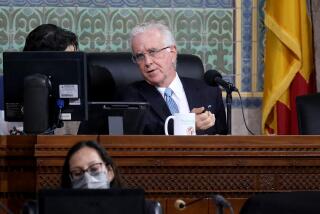Information Overload Clouds Internet Access Debate
- Share via
The Los Angeles City Council, long considered a key battleground in the debate over high-speed access to the Internet, suddenly is faced with an array of conflicting political, legal, business and technical developments, all of which make the outcome of its deliberations increasingly hard to predict.
For months, the council has heard testimony and received reports on the feasibility of requiring local cable companies to make their lines available to Internet service providers, a system known by proponents as “open access” and by opponents as “forced access.”
The issue is hotly contested because cable connections are much faster than traditional phone hookups, making them a far more attractive way of accessing the Internet. The council has a role in the debate because it authorizes franchise agreements to cable companies, and is currently reviewing the agreement with MediaOne because that company has been purchased by AT&T.;
Similar debates are playing out across the country and in Washington, where Federal Communications Commission Chairman William Kennard is in the driver’s seat; Kennard is in Los Angeles today and is expected to address the issue at a cable convention.
Until recently, it had appeared that the City Council majority was reluctant to endorse forcing open the cable system. To the extent that there was council support for requiring “open access,” most of it seemed politically motivated by the fact that Mayor Richard Riordan opposes the idea--and most council members would rather vote against the mayor than with him.
Then last week, AT&T;, the biggest player in the cable debate, offered to accept a modified “open access” position, significantly eroding the argument that the idea is not technically feasible. Just as importantly, its changing position buoyed its critics, who said it was evidence the company cannot be trusted.
“AT&T; has been factually inaccurate and disingenuous throughout this,” said George Kieffer, a lawyer and lobbyist who is working for GTE in the open-access debate. Its arguments have “melted away as time has gone by,” he said.
In addition, the Southern California Open Access Alliance--a group whose backers include America Online, AT&T;’s chief adversary in the debate--produced poll numbers showing that Los Angeles residents overwhelmingly like the idea of making high-speed Internet access available to a variety of providers.
The poll Culver City this week became the latest municipality to require open access as a condition of approving the transfer of MediaOne to AT&T--the; very same issue that the West Hollywood City Council will consider next week and that the Los Angeles City Council will take up next year.
All of that has given open access proponents a sense that the momentum is with them, and they are redoubling their efforts, as are those on the other side.
Councilman Alex Padilla, a newcomer to the council with a degree from MIT, has taken charge of the issue and expects to bring it to a vote sometime early next year. He will not say how he’s inclined to vote.
What Padilla will say is that the issue has become a major point of contention at City Hall. In the third quarter of 1999, more money was spent lobbying on open access than any other city issue, and that money is pouring in from both sides.
Riordan’s chief of staff, Kelly Martin, is among those who believe that it would be wrong for the council to force new regulations on AT&T; as a condition of its acquisition of MediaOne. Instead, she favors a slower approach and argues that the city should limit its involvement to protecting against red-lining--rolling out the cable services in wealthy neighborhoods but not poor ones--and making sure that the city continues to receive its franchise fees.
Curiously, Riordan no longer is participating in the city debate. After first lobbying against open access, Riordan then announced that he had discovered his wife owns stock in America Online. He then declared a conflict of interest and bowed out of the debate. Martin continues to participate, since she said she has no such conflict.
She’s part of a big crowd.
Just this week, a group called Hands Off the Internet, which has ties to the cable industry, released a report detailing millions of dollars in costs they say the city would have to pick up if it tried to enforce new Internet access rules on the cable companies.
That report, prepared by the Rose Institute of State and Local Government, concluded that it would cost the city between $1 million and $6.5 million a year to regulate the cable companies’ compliance with “open access” rules.
The same study also found that the city could lose $2.8 million to $8.6 million in franchise fees if the government forces open the cable systems and loses the right to collect fees as a result. Finally, the study identifies what it says are tens of millions of dollars of lost savings to consumers who have to wait longer for the benefits of Internet and telephone services available through the cable systems. That money would be lost, the study, contends, because cable companies will be slower to roll out their new services in areas where they face additional regulation.
All of those conclusions have been challenged by other researchers.
The bevy of conflicting positions on the issue has propelled the high-speed Internet access debate to the courts. The U.S. 9th Circuit Court of Appeal is considering a challenge to the open access system adopted by the city of Portland. That ruling could set new rules for this area, as could the FCC, though agency chief Kennard has steadfastly resisted calls for him to order open access.
More to Read
Sign up for Essential California
The most important California stories and recommendations in your inbox every morning.
You may occasionally receive promotional content from the Los Angeles Times.














